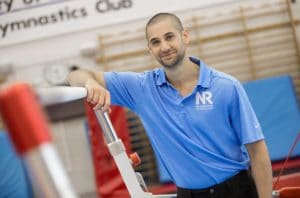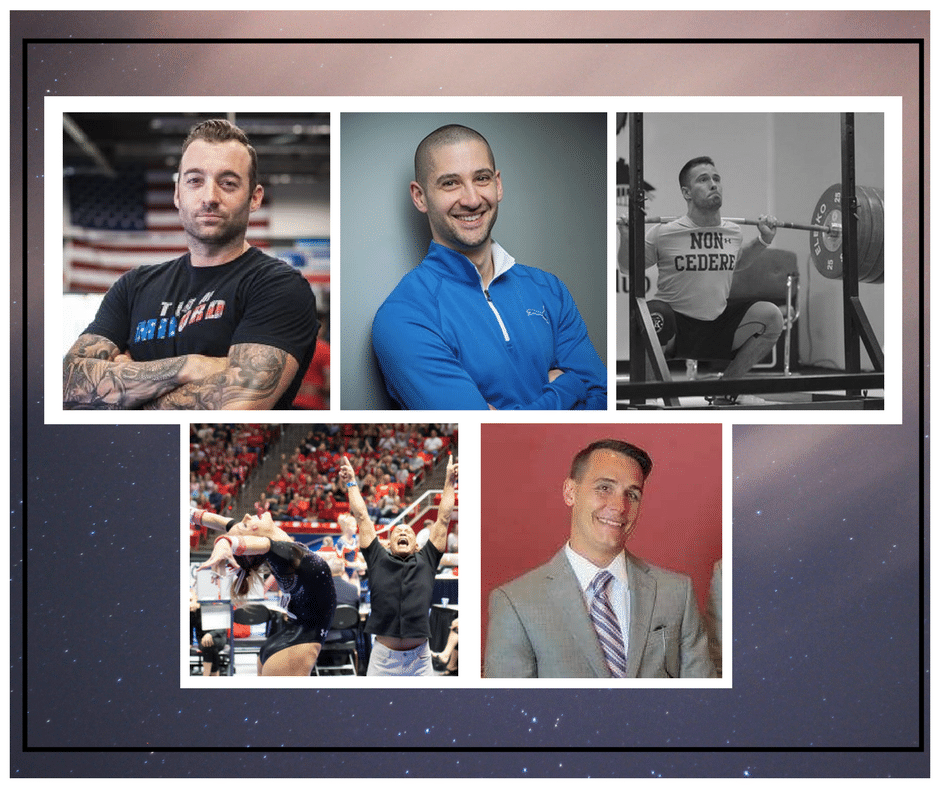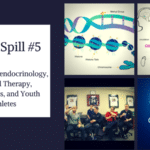How to Fail Like a Professional [Part 4 – Coaches ]
Today, I will wrap up the really awesome collaborative blog post series. In case you missed Part 1, Part 2, and Part 3, be sure to check those out. Today things will end with some of the best coaches that I know. As I mentioned, many of them were former high-level athletes themselves, so they could have easily been put in last weeks Part 3 post. Never the less, enjoy another round of super valuable advice related to failure! To recap, the two questions they answered (taken from Tim Ferris great book, Tribe of Mentors) were,
Table of Contents
#1 – “How has a failure, or apparent failure, set you up for later success? Do you have a “favorite failure” of yours?”
#2 – “What piece of advice would you give someone currently experiencing a similar failure, or apparent failure, given what you have been through?”
.
Nick Ruddock

(Instagram = @nickruddock) / (www.nickruddock.com)
Former Great Britan Junior Elite National Team Gymnastics Coach, Current Performance Consultant for 14 Gymnastics Federations Worldwide
1. [Favorite “Failure”]
I was only a teenager, two weeks out from moving my life to the USA to work in one of the highest producing gymnastics clubs in the world, with a team of exceptional coaches to learn from. All the stages in the UK had been done. I’d sold a ton of my assets, told everybody I was leaving and was awaiting the VISA. But it didn’t happen. At the last moment, I was informed that the VISA could not be issued, and I was not eligible to move to the USA.
This was a pretty shocking time for me, particularly being so young. I felt embarrassed, disappointed, angry and most of all a little empty.
In the essence of dusting myself off and moving on, I changed course and relocated in the UK. Shortly after this, doors opened for me, gaining credibility and within a few years was appointed the National Coach for GBR Juniors. That was another key stepping stone to the work I have the privilege of doing now and around the world.
Destiny pulls you forward like a magnet. It opens doors for you. You just need the right mentality to see it.
2. [Advice]
We all experience bumps in the road, just like our athletes experiencing an injury. But these moments are mere snippets of our life, which do not have to determine the final outcome. I don’t generally feel I have ever experienced real suffering. When I compare my life and all its comforts and blessings to those that live without shelter, food and water, I consider myself extremely fortunate.
Gratitude through time of hardship is extremely important. I constantly remind myself ‘if this is all I have to deal with then I don’t have a lot to complain about.’ Best Wishes,
– Nick
.
Jason Leydon

(Instagram = @jasonleydon) / (www.crossfitmilford.com)
Owner and Head Coach of CrossFit Milford, 2nd Place CrossFit Games Team in 2015, Coach to Multiple CrossFit Games Champions
1. [Favorite “Failure”]
I think that the most important thing for all readers to keep in mind is that “failure” is nothing more than a state of mind. How you view your experiences can shed light into your path that is in front of you. Meaning, all instances are opportunities. These failures are experiences that present opportunities for more growth and progress if viewed as such. The greatest minds in the world are merely normal individuals that don’t fear failure. These men and women embrace it and are able to learn from it and continually push forward
I believe that this self-actualization comes through the ability to step outside yourself and reflect. Reflection, which for me occurs through meditation, is where I am able to truly step outside myself and check my “performance.”
My biggest reflection came nine years ago. This was when I was with my now wife, we were dating for three years at this point. In this juncture in my life I finished college and had moved on from my major. I studied exercise science and health in College and post-college I made the decision to follow my dreams overseas in basketball. When this ended I was at a crossroads and went a different route to see what else was out there.
As I was sitting with my wife at the table I had my biggest and most prominent reflection yet, I was miserable with what I was doing. My biggest “failure” occurred when I didn’t follow my heart. I started down a path that was not by true calling. This was due to fear of starting my own business as a strength coach. So, as I was sitting there at the table with my wife I was able to recognize my fear and through her courage and faith in me start my journey doing my true admission and calling in this space. It is now nine years later, and each day I wake up so thankful that I was able to recognize my fear and step beyond it. This fear gave me the opportunity to go out on my own and do what I truly love to do each day.
2. [Advice]
So, my advice is two fold. The first is to follow your passion. Within this life we have one go at it. Live your life doing what you love to do and in a space that allows you to provide the best of yourself in helping others.
The second is to fail and fail often. Do this in the area that you truly love, and you will never see anything as a failure, but rather a chance to step outside yourself, reflect, learn and then grow.
– Jay
.
James Parent

(Instagram = @jamesparent) / (www.tumbltrak.com)
Vice President of Tumbl Trak
1. [Favorite “Failure”]
I had the same type of failure happen early on in both of my jobs (coaching and product design). The failure was in rushing something along because of ego. I had a group of talented athletes who could have easily won every competition. I wanted to show the world that I was an amazing coach and I knew this group of kids could do it. Sadly I cared more about how I looked from the outside and I pushed too hard and they lost the excitement of what they were doing. I was also working on a product which had the potential to be a “game changer”. I rushed it along and I overlooked a design flaw because I wanted to get it out for testing. That design flaw ended up hurting one of the testers. In both instances, I cared way more about my ego as opposed to taking the time to do it correctly. The good news was that after those failures I was able to course correct. Things changed in the gym, the morale improved and in turn the skills improved. I also, took my time on the development of that product and it has been one of the best products recently.
2. [Advice]
My advice is to 1) create a vision in your head of what you want the outcome to be so you have something to strive towards, and 2) have some sort of daily introspection where you think back on your actions and if they helped push you towards that vision. Without a goal and without introspection it is hard to know if you are on the right path or not.
.
Tom Farden

(http://utahutes.com/index.aspx?path=wgym)
Co-Head Coach of University of Utah Gymnastics, Multiple Top 10 NCAA Finishes in Division 1 Gymnastics
[Favorite “Failure”]
Failure stings. Nobody likes to be stung so if I continue to approach my career as a game of chess and not checkers I know that I have given my best efforts and if failure is still the outcome then I’ll live with it.
2. [Advice]
If one does fail, move on leave it in the past and set your sights on your next goal. Be great!
– Tom
.
Mike Cerbus

(Instagram = @StrengthInFaith)
Former Nationally Ranked and Multiple Time Olympic Lifting Medalist, Team Power Monkey Olympic Lifting Coach, Now Full Time Olympic Lifting Coach
As coaches and mentors, we all understand and value the concept that stress brings change (hopefully more positive than negative) and growth. My maturity as a professional comes with strong retrospect towards some of my perceived failures as an athlete. I have so many experiences to draw from and offer perspective to current athletes, friends, and peers because my failures in the past have pushed me to evaluate the “whys” of the situations. In the most general summary, by fixing and controlling smaller details of a situation, I see that many training and competition failures could have been avoided. So my realization and current practice is to look at things with less emotion and a bit more practicality:
- What can situational variable(s) can I control?
- Why do I want to control or promote these?
- Will this focus on a micro level help towards the macro level?
I think that I responded well from failures and trials because I have never looked at something as a true failure, but rather a single moment and opportunity to react in a way that would reflect my character and principles. I place a lot of thought and energy into my faith, and in turn this has always helped me to (1) quickly overcome regret or disappointment, (2) place the most value on the current moment, and (3) not get too anxious over things that have not yet occurred.
In short, I would advise that everyone give thought to their purpose; then, realize that every moment of perceived failure and success should just be taken as an opportunity to practice and refine your purpose.
– Mike
So that does it for all the 4 blog posts related to addressing and overcoming failure. I hope you found a ton of great info over the last few weeks. Have a great week!
Dave Tilley DPT, SCS, CSCS
CEO/Founder of SHIFT Movement Science and Gymnastics Education
.
Tom Farden PC – http://grfx.cstv.com/photos/schools/utah/sports/w-gym/auto_player/11839558.jpeg
Mike Cerbus PC – https://cdn.shopify.com/s/files/1/0507/9565/t/12/assets/athletes-mike-cerbus.jpg?14534044810311485463




